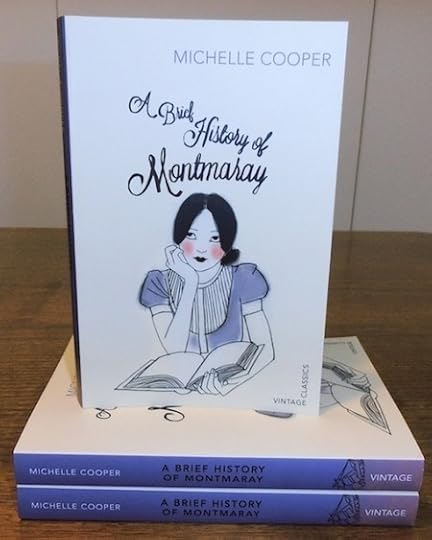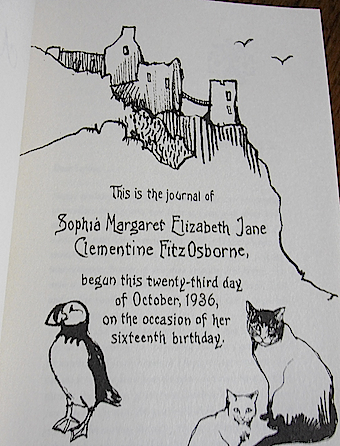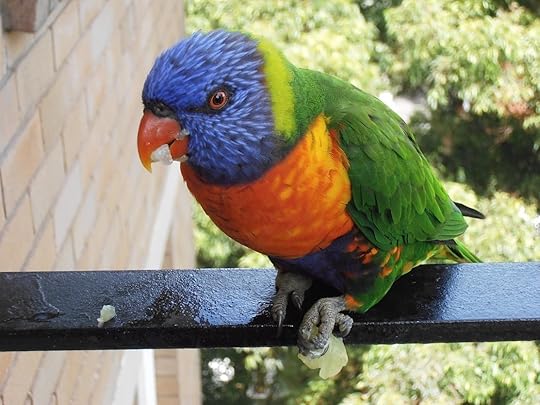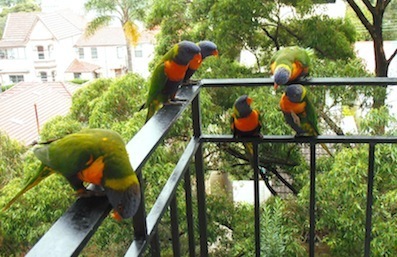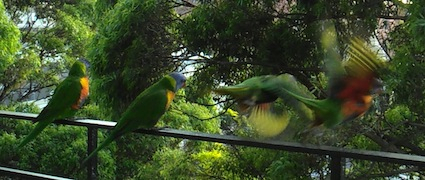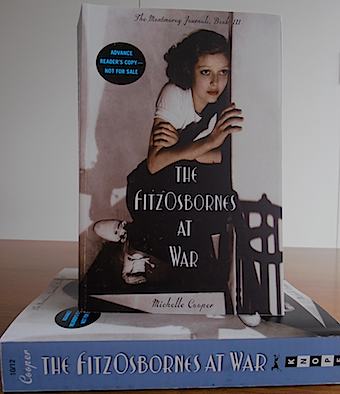Michelle Cooper's Blog, page 30
July 4, 2012
Vintage Classics Book Giveaway
A Brief History of Montmaray is being re-published as a Vintage Classic Children’s book next month. This new edition has a lovely illustrated cover by Samantha Battersby and features the original illustrated introduction page by Zoë Sadokierski:
And there are some added extras – historical background information, reading group discussion questions and information about some of Sophie’s own favourite classics. It goes on sale in Australia and New Zealand on the first of August, but I’m also giving away three copies here. For all those North American readers who were curious about the original text of A Brief History of Montmaray before it was edited for American readers – here it is! And for Australian and New Zealand readers who already have the Australian edition – um . . . oh look, pretty cover! And cute sketches of puffins and teapots and cats inside the covers! (Note: if an Australian or New Zealander wins a book and would actually prefer a copy of the North American paperback, I’ll send them that instead.)
Usually, when I hold a book giveaway on my blog, I ask people for book recommendations, but I thought I’d do something a bit different this time. To enter this book giveaway, leave a comment below about your favourite film (or television series) adapted from a book you’ve loved. I’ll start you off with some of my favourites.
1. Brideshead Revisited, 1981 television series. One of those rare examples of a television series being better than the book, in my opinion. All those pompous sermons in the final section of the novel were turned into poignant monologues or the sort of dialogue that real people might actually speak. Special mention must go to Jeremy Irons for transforming snobby, wife-abandoning Charles into a sympathetic character. And the bear who played Aloysius did a pretty good job, too. (Let’s just ignore that 2008 film version, shall we?)
2. Cold Comfort Farm, 1995 film. This has a dream cast – Ian McKellen, Eileen Atkins, Miriam Margolyes, Rufus Sewell (in unbuttoned shirt), Stephen Fry, Joanna Lumley and Kate Beckinsale. The film’s almost as funny as the book, and that’s high praise.
3. Harry Potter and the Goblet of Fire, 2005 film. I think this was my favourite Harry Potter film. The Yule Ball! Draco as a ferret! Hedges that eat people! A Voldemort who was even scarier than in the book! (They shouldn’t have killed the dragon, though – that was just mean.)
4. The Hitch Hiker’s Guide to the Galaxy, 1981 television series. Admittedly, it’s been a long time since I watched it and I’m sure today’s teenagers would scoff at the low-tech special effects, but I really loved this series. It probably helped that quite a few of the cast members had been part of the original radio series, but I can’t imagine a better Arthur Dent than Simon Jones. (And no, I haven’t seen the 2005 film version.)
5. Careful, He Might Hear You, 1983 film. A lovely film with a stellar Australian cast (including Robyn Nevin, Wendy Hughes and Geraldine Turner), based on Sumner Locke Elliott’s beloved novel.
So, what is your favourite film or television series, adapted from a book you’ve loved? Comment below for a chance to win one of three signed copies of the new Vintage Classics edition of A Brief History of Montmaray.
Conditions of entry:
1. This is an international giveaway. Anyone can enter.
2. Make sure the e-mail address you enter on the comment form is a valid one, so I can contact you if you win (no one will be able to see your e-mail address except me, and I won’t show it to anyone else). Please don’t include your real residential or postal address anywhere in the comment. However, it would be nice if you mentioned which country you live in, because I’m curious about who reads this blog.
3. The three winners will be chosen at random, unless there are three or fewer comments – in which case, it won’t be random and all will win prizes.
4. This contest and/or promotion is not sponsored or authorised by Random House Australia. Random House Australia bears no legal liability in connection with this contest and/or promotion. (My Australian publishers say I have to put this bit in. This is the first time I’ve ever given away any of my Australian books on my blog.)
5. Entries close on the 1st of August, 2012, when the Vintage Classics edition of A Brief History of Montmaray goes on sale in Australia. The winners will be e-mailed then, and I will send off the winners’ books as soon as possible after that.
June 29, 2012
Miscellaneous Memoranda
- The National Year of Reading Read This! prize winners have been announced, after attracting lots of fabulously creative entries from young readers. I think my favourite entry was the knitted Wizard of Oz characters by twelve-year-old Lexi, although the papier-mâché model of James and the Giant Peach by Michelle, also twelve years old, was wonderful, too. (Also, I just discovered that ‘papier mâché’ is French for ‘chewed paper’. Thanks so much for telling me that, Oxford Dictionary.)
- Entries in the 2012 John Marsden Prize for Young Australian Writers are now open, with “young writers under the age of 25 [. . .] urged to enter the competition to share in $5,500 in prize money and have the opportunity to be published online and in the December issue of Voiceworks, Express Media’s literary quarterly.” You have until September to enter your short story or poem, with more information here.
- Speaking of young readers and writers, there’s a great new(ish) online magazine for teenage girls called Rookie. I wish magazines like that had existed when I was a teenager. (Sadly, the internet hadn’t even been invented when I was a teenager.)
- There’s an interesting article here by Anthony Horowitz about how book covers end up plastered with glowing endorsements from other writers. I’m currently reading a YA novel by an established US author, and the Cassandra Clare endorsement (“A gorgeously written, chilling atmospheric thriller.” CASSANDRA CLARE, bestselling author of THE MORTAL INSTRUMENTS SERIES) takes up more space on the front cover than the name of the book’s author. But do book buyers actually pay any attention to these quotes? As the first commenter on the article says, “Probably the only people who would truly benefit from an author’s endorsement are new or little-read authors – exactly the kind of people who (for completely understandable and rational reasons) are least likely to get them.”
- I recently read two fascinating articles about successful novelists who decided to stop writing (and, presumably, to stop endorsing other authors’ books). “There’s just too much stress on authors,” said Steph Swainston, author of the Castle series. She was unhappy with the pressure from fans and publishers to produce a book a year, and disliked the modern need for authors to be ‘celebrities’ and engage with social media (“The internet is poison to authors”). The other author, Elizabeth Harrower, was less forthcoming about why she stopped writing in 1966:
“It’s not as though she ran out of things to say – ‘there were probably too many things to say’. It’s not as though her work was poorly received – her second novel, The Long Prospect, was described as ranking ‘second only to Voss as a postwar work of Australian literature’. It’s not as though she was busy raising children – she never married and is childless.”
In the end, she simply says, “[I] realised I just can’t be bothered any more.”
- To end on a more positive note, this year The Famous Five celebrate the seventieth anniversary of their first adventure, Five on a Treasure Island. Naturally, the celebratory feast will feature ham sandwiches on crusty bread, hard-boiled eggs, currant buns and lashings of ginger beer.
June 20, 2012
This Writing Life
Shannon asked me about the new book I’m working on, so I composed a long blog post on the subject, complete with jokes and a cool photograph of a turtle. But then I read over it and realised I didn’t feel comfortable revealing that much detail about a writing project that’s at such an early stage, it doesn’t even have a title, let alone a publisher.
So I deleted the post.
But it wasn’t a complete waste of time, because I also realised that writing that post had made me feel more confident about this new book. After I finished The FitzOsbornes at War, I flipped through my mental catalogue of Ideas For Books and decided I needed to write something that would not be the start of a series, would not be a complicated family saga, would not include scenes of heart-rending anguish, and would not require much research. This next book would be fun and easy to write!
Of course, it hasn’t turned out quite the way I’d expected. I’ve spent the past six months compiling a vast folder of notes and diagrams and photocopies, but feel I’ve barely started on the research. It isn’t a complicated family saga, but at the heart of the story is a mystery that requires far more complicated plotting than I’ve ever before attempted. It was supposed to be a stand-alone novel, but I already have ideas for a sequel and I’m not even sure the book would be best described as a ‘novel’. Plus, there’s at least one scene of heart-rending anguish.
But as I wrote the blog post, which was in the form of a dialogue between the two main characters, I realised that I actually knew quite a lot about how the whole thing would fit together. I knew most of the facts I needed to know, and even better, I could see what I still didn’t know and I knew how to find out what I needed. The best part, though, was that as the two characters argued and joked and talked over the top of one another, I could hear their voices in my head just as clearly as I used to hear the FitzOsbornes. I could see the two girls waving their hands about and rolling their eyes at each other – I even laughed out loud at one of their jokes (yes, their joke, not mine). And that’s when I thought that I might actually be able to write this book, and that made me very happy.
Unfortunately, that doesn’t really answer Shannon’s question, but I will say that the book is about science and history, and it’s set in Sydney, and I wrote a bit about it here.
On a slightly different topic, I’ve noticed that a tiny corner of Tumblr has been taken over by some FitzOsborne fans, who have set up a blog devoted to Montmaray. There are some fabulous graphics based on the books, as well as a film trailer that looks so professional that, for a moment, I wondered if I’d absent-mindedly sold the film rights to the BBC, then forgotten about it. However, I think my favourite fannish creation is this post, which sorts the FitzOsborne cousins into Hogwarts Houses and gets it exactly right. It doesn’t include Henry FitzOsborne, but she is obviously in Gryffindor. I’m not sure about Carlos – Hufflepuff or Gryffindor? Aunt Charlotte would simply refuse to let that grubby old hat touch her head, then would stalk out to set up a Thestral racing syndicate (Minister for Magic: But . . . but we can’t permit those creatures to race each other! Half the spectators wouldn’t even be able to see which Thestral won! Aunt C: I shall announce the winner of each race. Now get out of my way, you silly little man.) As for the other characters, Rupert is clearly pure Hufflepuff, but what about Daniel – Hufflepuff or Ravenclaw? Would Julia end up in Slytherin or Gryffindor? Anyway, I love how those characters have wandered out of the books and into the imaginations of some readers. That’s what makes writing so rewarding, when the books take on a life of their own. It makes up for all those times when I was writing the Montmaray books and felt daunted and discouraged and wondered why I kept plodding on. It’s because eventually the books get finished, and they find a reader or two to love them.
And that’s what I keep reminding myself, as I work on this new book.
June 10, 2012
Alex and Me by Irene M. Pepperberg
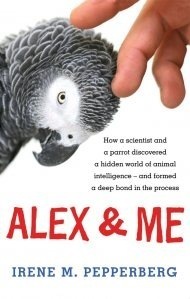 I love birds, and science, and books, so how could I not love a book about a talking bird, written by the scientist who raised him? Alex and Me is a touching, funny account of a scientist who trained an African Grey parrot to talk, in order to gather information about bird cognition and language. Alex learned how to label colours, materials and objects, knew ‘same’ versus ‘different’, was able to construct original phrases from words he’d been taught, could count to six and possibly add numbers, and even taught himself to segment words into phonemes, after being taught how to link English speech sounds to plastic letters. He played jokes on his trainers, loved to dance and be tickled, and said ‘I’m sorry’ and ‘Calm down’ during tense situations after watching people in the lab use these phrases. The book is full of entertaining Alex anecdotes – for example, he once ordered a toy parrot, ‘You tickle!’ and then, when the toy failed to respond, said, ‘You turkey!’ and stalked off in a huff. When recuperating at the vet’s after an operation, he wanted to talk to everyone he saw, including the accountant who was working late one night:
I love birds, and science, and books, so how could I not love a book about a talking bird, written by the scientist who raised him? Alex and Me is a touching, funny account of a scientist who trained an African Grey parrot to talk, in order to gather information about bird cognition and language. Alex learned how to label colours, materials and objects, knew ‘same’ versus ‘different’, was able to construct original phrases from words he’d been taught, could count to six and possibly add numbers, and even taught himself to segment words into phonemes, after being taught how to link English speech sounds to plastic letters. He played jokes on his trainers, loved to dance and be tickled, and said ‘I’m sorry’ and ‘Calm down’ during tense situations after watching people in the lab use these phrases. The book is full of entertaining Alex anecdotes – for example, he once ordered a toy parrot, ‘You tickle!’ and then, when the toy failed to respond, said, ‘You turkey!’ and stalked off in a huff. When recuperating at the vet’s after an operation, he wanted to talk to everyone he saw, including the accountant who was working late one night:
“‘You want a nut?’ Alex asked her.
‘No, Alex.’
He persisted. ‘You want corn?’
‘No, thank you, Alex, I don’t want corn.’
This went on for a little while, and the accountant did her best to ignore him. Finally Alex became exasperated and said in a petulant voice, ‘Well, what do you want?’ The accountant cracked up laughing and gave Alex the attention he was demanding.”
I must admit that Dr Pepperberg is not the world’s greatest writer, and this book would have benefitted from further editing. I really didn’t need to know the details of the author’s childhood or her early studies, for example, and I would have liked more information about how Alex produced human-like sounds when he didn’t have lips or teeth. I’d also have loved some photos of Alex (although I later found a film clip of him in action). Another issue, barely alluded to in the book, is how captivity affected Alex’s life. His beak, claws and wings were clipped when he was young, and he never had the chance to fly, to sit in a tree or to mate with another parrot. Dr Pepperberg had difficulties securing permanent research funding, and the constant moves around the country made Alex so stressed that at times, he pulled his own feathers out. I’d like to think that a similar research project nowadays would show greater concern for the bird’s welfare, although it’s clear from the book that Dr Pepperberg and Alex had a strong, affectionate bond and that she was devastated by his relatively early death at the age of thirty-one.
One thing that surprised me was how resistant many scientists were to Dr Pepperberg’s theories (and evidence) about animal cognition and language, with many refusing to accept that animals could actually use ‘language’. Some continue to believe that Alex was merely repeating the sounds he heard without any understanding of their meaning, and that his intelligent behaviour was simply a ‘Clever Hans’ effect, with Alex responding to cues from his handlers during testing. This seems highly unlikely to me – the research was carefully planned to control for the ‘Clever Hans’ effect by using multiple trainers and testers. Anyway, Alex repeatedly demonstrated complex, novel, situation-specific behaviours that could not have been prompted by his handlers. But perhaps some scientists feel threatened by the notion that animals other than themselves are capable of intelligent behaviour, of using language – of even, perhaps, experiencing human-like emotions.
I’ve never met an African Grey parrot, but I’ve spent the past decade watching the wild rainbow lorikeets that hang out on my apartment balcony and they use language. Rainbow lorikeets don’t imitate human sounds, but are capable of ‘almost continuous screeching and chattering’, as Jim Flegg’s Birds of Australia says. They make happy, murmuring sounds when they’re feeding or grooming each other; enquiring calls if their mate is out of sight, rising in intensity if the other bird doesn’t respond immediately; sharp, angry sounds when another bird muscles in on their territory; and inquisitive, chirruping sounds at me if I’m watering my balcony plants or appear to be eating something they might like. When baby rainbow lorikeets want their parents’ attention (which is pretty much all the time), they make a noise like bits of styrofoam rubbing against each other, and the harassed parents respond as quickly as they can. Isn’t that ‘using language’? But I think they go even further in human-like behaviours than simply using language.
One morning last year, I was awakened by the sound of some rainbow lorikeets screeching with distress outside my window. I went out to investigate, assuming they were being harassed by currawongs, and found a dead adult lorikeet lying on my balcony. It showed no obvious signs of injury or disease – the poor thing had simply died. Two lorikeets were sitting on the balcony railing, looking down at the dead bird and screeching, but they fell silent when they saw me and climbed down the railings to have a closer look. One of them started grooming the feathers around the dead bird’s face; the other took hold of the dead bird’s claw and gave it a couple of tugs, as if to urge it to wake up. The two birds climbed back up onto the railings to watch while I took the body away, and then flew to a nearby tree branch, where they sat for twenty minutes gazing at the spot where the dead bird had been. Did they feel sad? Or confused? It’s impossible to tell, but they were certainly unsettled by what they’d seen – and this was an adult bird that had died, not their baby.
As I don’t have any photos of Alex, here are some photos of rainbow lorikeets. First, a rainbow lorikeet eating a grape:
And a group of rainbow lorikeets hanging out on my balcony:
And finally, rainbow lorikeets take flight:
May 27, 2012
Reading Roundup
I’ve read some really good novels lately, which is fortunate for me, because the non-fiction I’ve been reading (as research for my next book) has been very heavy (in both the literal and figurative senses). Here are some of the novels I’ve enjoyed:
The Beginner’s Goodbye by Anne Tyler
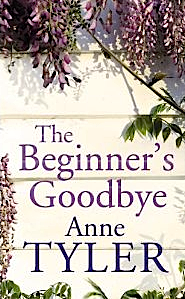 I’d feared this might be merely a reprise of The Accidental Tourist, and it’s true the protagonists of these novels have many similarities – they are both introverted, socially-awkward men who write guidebooks, and they have both just lost a beloved family member in shocking circumstances. However, this book feels quite different in a lot of ways. It’s shorter, for one thing, and lighter in tone. In The Beginner’s Goodbye, Aaron’s wife has died in a freak accident, and there is nobody he can blame – not even God, because Aaron is an atheist. He copes with the loss of Dorothy by moving out of the house where she died and throwing himself into his work at the family publishing firm. He tells everyone he’s doing fine and he even believes it, until he suddenly begins to ‘see’ Dorothy. At first, she is a silent presence in his life, but eventually they begin to talk, and to argue, with more honesty than they ever did when she was alive. Aaron’s growing self-awareness feels true, his well-meaning friends and relatives are interesting and funny, and I loved the customary glimpse of a character from a previous Anne Tyler novel (in this case, it’s Luke from Dinner at the Homesick Restaurant, now grown up and yes, running a restaurant – perhaps he inherited it from his uncle Ezra). My only criticism would be that the final chapter wrapped things up a little too neatly (Luke even provides the moral of the story, as if we couldn’t work it out for ourselves), but by that stage, I was so fond of the characters that I was happy to see that they were happy. This is highly recommended for Anne Tyler fans, even if it’s not her best novel. There’s a good review of the book here and you can read my previous post about Anne Tyler here.
I’d feared this might be merely a reprise of The Accidental Tourist, and it’s true the protagonists of these novels have many similarities – they are both introverted, socially-awkward men who write guidebooks, and they have both just lost a beloved family member in shocking circumstances. However, this book feels quite different in a lot of ways. It’s shorter, for one thing, and lighter in tone. In The Beginner’s Goodbye, Aaron’s wife has died in a freak accident, and there is nobody he can blame – not even God, because Aaron is an atheist. He copes with the loss of Dorothy by moving out of the house where she died and throwing himself into his work at the family publishing firm. He tells everyone he’s doing fine and he even believes it, until he suddenly begins to ‘see’ Dorothy. At first, she is a silent presence in his life, but eventually they begin to talk, and to argue, with more honesty than they ever did when she was alive. Aaron’s growing self-awareness feels true, his well-meaning friends and relatives are interesting and funny, and I loved the customary glimpse of a character from a previous Anne Tyler novel (in this case, it’s Luke from Dinner at the Homesick Restaurant, now grown up and yes, running a restaurant – perhaps he inherited it from his uncle Ezra). My only criticism would be that the final chapter wrapped things up a little too neatly (Luke even provides the moral of the story, as if we couldn’t work it out for ourselves), but by that stage, I was so fond of the characters that I was happy to see that they were happy. This is highly recommended for Anne Tyler fans, even if it’s not her best novel. There’s a good review of the book here and you can read my previous post about Anne Tyler here.
The Getting of Wisdom by Henry Handel Richardson
I had read this before, but that was so long ago I couldn’t remember anything about it, except that I’d liked it. This is a wonderfully honest story of a precocious, headstrong country girl sent to a snobby boarding school in 1890s Melbourne. Poor Laura gets into one scrape after another as she attempts to ingratiate herself with her classmates, but her gaudy, home-made frocks, outspoken manners, and lack of interest in boys means she’s doomed to failure. Fortunately, she manages to make it out of school with her self-esteem intact, and the final chapter implies she goes out into the world and achieves great things (unlike her classmates), because “even for the squarest peg, the right hole may ultimately be found”. The edition I read also included a hilarious review quote from a 1910 journal, which sternly declaimed:
“The book is calculated to impress very unfavourably those who do not know that the Australian girl is a much cleaner, wholesomer and straighter person than any of the characters portrayed. It is a book we should strongly recommend adults to keep out of the hands of girls.”
So, you’ve been warned.
Insignificant Others by Stephen McCauley
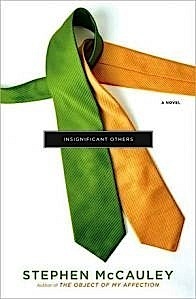 This felt a lot like a grown-up version of Peter Cameron’s Someday This Pain Will Be Useful To You, as both narrators were droll, articulate and perceptive when observing the failings of others, but were quite unable to acknowledge or fix their own problems. And the narrator of Insignificant Others, Richard, has plenty of problems. He has a distant relationship with his live-in boyfriend, who is probably cheating on him; he has an affectionate but futile attachment to a married man; he has become obsessed with exercising at the gym, to the detriment of his health; and he’s frustrated by his job at a software company. I’m not sure I’d usually care about any of these problems, but Richard’s narration makes the whole thing into a very entertaining satire of modern American life. For example, here’s Richard contemplating his homophobic, religious-fanatic secretary:
This felt a lot like a grown-up version of Peter Cameron’s Someday This Pain Will Be Useful To You, as both narrators were droll, articulate and perceptive when observing the failings of others, but were quite unable to acknowledge or fix their own problems. And the narrator of Insignificant Others, Richard, has plenty of problems. He has a distant relationship with his live-in boyfriend, who is probably cheating on him; he has an affectionate but futile attachment to a married man; he has become obsessed with exercising at the gym, to the detriment of his health; and he’s frustrated by his job at a software company. I’m not sure I’d usually care about any of these problems, but Richard’s narration makes the whole thing into a very entertaining satire of modern American life. For example, here’s Richard contemplating his homophobic, religious-fanatic secretary:
“The degree to which one is obliged, for the sake of tolerance, to be tolerant of the intolerant has never been clear to me.”
And, when arguing with his cheating partner:
“I hate when truthfulness is offered up as a sign of love and friendship, especially when it’s truthfulness about betrayal.”
And, after being berated, yet again, by his sister for not having children:
“The world of parents was divided between those like Benjamin who, worries about Tyler notwithstanding, had unqualified love for their kids and saw childlessness as a disability, and those like my sister Beth, who had ambivalent feelings about their offspring and therefore labelled childlessness as unmitigated selfishness.”
Recommended, unless you’re a fan of George W. Bush (Richard’s hilarious rants about Bush’s inadequacies feature throughout the novel). If you’d like to know more, there’s a review and excerpt here.
May 15, 2012
Regarding Internet Piracy
I’ve been contemplating this topic for a while, but put off blogging about it because . . . well, I suspected it would be a difficult and depressing experience. However, I’ve decided that writing this post as a discussion question, rather than a one-sided rant, might end up being very informative for me. At the very least, it might make me feel less frustrated about the issue.
First, that term ‘piracy’. Perhaps that’s part of the problem? Pirates – either the traditional cutlass-wielding, skull-and-crossbones-flag-waving ones, or the modern, machine-gun-wielding, hostage-taking ones – are violent, murderous thugs. Using the same word for people who illegally download music, movies and books is hyperbole, and it makes illegal downloaders far less likely to take their own crimes seriously. But the thing is, internet piracy IS a crime, and it’s a crime that has victims. It’s just that illegal downloaders (or the people who upload the files in the first place) don’t seem to regard it as a crime, not even a minor crime.
This is where I, a Generation X technophobe with an extremely slow dial-up internet connection, confess my ignorance. I’ve never downloaded a movie, a song or a copyrighted book from the internet – not just because I lack the technological ability, but also because I believe that if I take someone’s creative work, I should pay them for it (assuming they’re asking for payment). To me, ‘don’t steal from other people’ is a basic moral principle, along the same lines as ‘don’t hit other people’. But the recent SOPA* proposal generated lots of online discussion that made me realise that there are many internet users who regard downloading copyrighted material for free as either ‘not really stealing’ or ‘justifiable stealing’. Here are some of the justifications I read:
I’m not hurting anyone if I illegally download movies/music/books. Okay, maybe a few huge multi-national companies will earn a bit less money, but they’re ripping us consumers off, anyway, so they deserve it.
I’ll concentrate on book piracy here, rather than movie and music piracy, because I’m an author. Yes, you are hurting someone when you choose to download a pirated book, instead of buying it. You’re hurting the author. If you’d bought the book, the author would receive some royalties from the sale. This would allow the author to pay her electricity bill and buy some more printer cartridges, so that she could write another book. The publisher would also note that the author had sold some books, so would be more likely to publish the author’s next book. If the author sold lots of books, the publisher might actually sign up the author’s next book before it was even written, and pay the author an advance, which would allow the author to pay both her electricity and her gas bills. This would make her so happy that she might even be able to give up her part-time job(s) and become a full-time writer, so her next book would be written much faster.
Books are too expensive. If they were cheaper, I’d buy them. As it is, I’m forced to download them illegally.
As an avid reader, I have some sympathy for the ‘books are expensive’ viewpoint, but if you can afford a computer and a high-speed internet connection, you can probably afford to buy a paperback every now and again. Most online booksellers sell books at discounted prices, particularly when a new book in a series comes out – for example, the e-book edition of A Brief History of Montmaray was on sale for less than five dollars during April. You can often find bargains in second-hand book shops (yes, I know authors don’t receive royalties when the book is sold a second time, but they do when the book was sold the first time). You can also borrow the book from a library – the library bought the book, so the author gets royalties from that initial sale. (In Australia, there’s also a government scheme that pays authors a small amount of money each year, proportionate to the number of their books in libraries.) There are lots of cheap options for book lovers. And if you truly value books, don’t you expect to pay something for them?
There’s also a reason that books are expensive. A lot of work goes into creating them – not just the author’s work, but the labour of editors, proof-readers, designers and typesetters (even legal advisors, in the case of my books, because I don’t want to be sued for defamation by a real person I’ve put into my novels). Each of these people deserves some compensation for their work. If no-one pays for the book, how will these workers earn any money?
Sometimes I wonder if readers think all writers are as rich as J. K. Rowling. I’m certainly not, and neither are any of the writers I know. That’s okay for me – if the aim of my life was to earn loads of money, I’d do something other than writing. I don’t live a luxurious life. I don’t need a car, or a TV, or a mobile phone, or an iPod, and I don’t need to go on overseas holidays. But I still have to pay my bills and buy food, so I do need some money.
Books should be for everyone to share. The people who run file-sharing websites are doing society a favour, out of the goodness of their hearts.
No, the people who run file-sharing websites are making a fortune from advertising on those sites. They’re doing it to make money, and none of that money goes to the artists, musicians and writers who created that content. There’s plenty of free, legal creative content on the internet, uploaded by creators who want to share their work, and that’s great. For instance, anyone can read my blog posts for free, either here or at blogs where I’ve done guest posts. But when I spend two years writing a novel, I’d really like to get paid some money for it when it’s finally published.
Creators should be flattered that people are illegally downloading their work. It shows how popular the work is and creates a bigger market for the creator’s next work.
Illegal copies of The FitzOsbornes at War were all over the internet a few hours after the book went on sale in Australia. I didn’t feel flattered. I felt depressed that my hard work was being stolen.
I’m flattered if readers write nice comments about my books on their blogs. I’m flattered if readers care enough about my characters that they’re inspired to write Montmaray fanfiction**. I’m flattered if people say they’ll buy my next book because they liked the last one. But I’m never going to feel flattered by people who illegally download my books instead of buying them.
The book/movie/music I want isn’t available where I live. I shouldn’t have to wait six months for it to reach my country. I’m forced to download it illegally.
I’m sympathetic to this viewpoint, too. In a global fandom, it seems unfair that some people get instant access to creative work and are able to discuss it, while others have to wait. But in the case of books, publishers often have good reasons for releasing a book when they do. For example, they might think a book will sell best if it’s released at the start of the school year, or the start of the summer holidays, so the release dates will differ for the United States and Australia. (I know I don’t need to explain this to Australians and New Zealanders, but I’m amazed at the number of Americans who’ll ask how my summer vacation’s going in the middle of July.) Anyway, in the case of books, you don’t have to wait. You can order a (paper) book online and get it within days of the original release date, no matter where you are in the world. If you order from sites like The Book Depository, you won’t even have to pay postage. It’s true that if you want the e-book, you will have to wait till it reaches your territory, due to territorial copyright laws. But don’t penalise the author or the publisher for this – they’re just following the law. (Author Seanan McGuire wrote a post about this recently.)
I wouldn’t upload my favourite e-book to one of those big file-sharing sites, but what’s wrong with me sharing it with my friends? It’s no different to lending them a paperback that I’ve bought.
I don’t have an e-reader, so I’m not sure of the technical details, but some e-books can be legally shared (in a limited way) with friends, and that’s fine, just as some libraries have e-books available to borrow. The problem is when one person sends an illegal copy of an e-book to a friend, and that friend shares the copy with several others, and one of them posts a link to the file on Twitter, so that in the end, several hundred people have read the book for free. That’s quite different to lending a paperback to a friend – in that case, only one person at a time can read it, and probably only half a dozen people, at most, will read the same copy of the book. I think the people involved in this sort of file-sharing are genuinely keen to spread their love of the book, and don’t see it as a large-scale problem. But when illegal downloads of the Montmaray books outnumber sales of the Australian editions, then I have a big problem, and so do my Australian publishers. There is no motivation for them to publish my next book, because they know it won’t sell enough to make them any money.
This whole issue reminds me of an article I read a few weeks ago in the Business section of The Sydney Morning Herald. Marcus Padley wrote about how the stock market depends on ‘integrity’ and he reflected on some conversations about life that he’d had with his teenage children:
“My kids are making some glorious backward steps of their own. There is a new code they have got from someone other than me, and God forbid it should become part of the financial markets. I am referring to the culture of taking things because you can, of exploiting any loophole. This culture says if people are dumb enough to let you take it, it’s not criminal, it’s smart. I blame the internet […] Knowing how to get away with things and getting away with them has become their philosophy and the consequences (lost industries) are too long term to be of concern to them.”
Leaving aside the obvious retort that the “taking things because you can” culture already IS a “part of the financial markets” (hence the Global Financial Crisis), I wondered if there really has been a generational shift in ethics due to the internet. However, I’m reluctant to buy into that ‘young people these days, they’ve got no morals’ attitude, which is why I’d like this blog post to be a question, rather than a statement.
If you have any insights into the issue of illegal book downloading, I would love it if you left a comment below. You can do it anonymously. (I know the comment form asks for your e-mail address, but you can always use a fake one. The only time I ask for valid e-mail addresses is if I’m doing a book giveaway, so that I can contact you if you win.) I’m genuinely interested in understanding more about this issue, because it has significant implications for my life as a professional writer.
Oh, and if you’ve ever bought one of my books – I’m very, very grateful to you.
*I’m not going to discuss SOPA, other than to say that the proposed legislation seemed to take a heavy-handed and probably ineffective approach to the very real problem of internet piracy.
**I think fanfiction is a wonderful and creative thing, but it’s best not to tell me about it if you’ve written Montmaray fanfiction. And please don’t try to make money from selling your Montmaray fanfiction, otherwise my publishers could get very cross at you.
May 6, 2012
Great (and Not-So-Great) Expectations
Life is short and there are many books in the world, so it’s not surprising that readers take short cuts when deciding what to read next. In my case, I often make decisions based on my experience with the author. If I’ve loved an author’s previous books, I’ll probably pick up his or her next book. If I’ve disliked a book, I’m unlikely to give that particular author another try, although I can sometimes be swayed by friends’ recommendations, award short-listings or the fact that there’s nothing else that appeals to me on the library shelves.
So it was that I picked up The Other Family, by Joanna Trollope, at the library last month. I’d read an earlier book by this author (I think it might have been The Choir) and I’d disliked it intensely. I didn’t like the characters, I wasn’t interested in their smug, boring, privileged lives and I thought the plot was stupid and pointless. I didn’t even like the author’s photograph. (Why do publishers put author photographs in books, anyway? I don’t care what the author looks like!) But it was years since I’d read The Choir, and I’d subsequently seen a positive review of Joanna Trollope’s most recent novel, and I was in the library, not a bookshop, so I wouldn’t be investing anything except a little time if I took the book home with me. So I did, and you know what? I liked it.
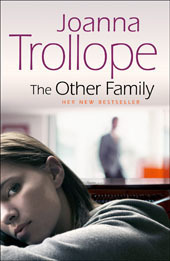 The Other Family begins with the sudden death of Richie, a moderately successful musician. Chrissie, the mother of his three daughters, is bereft, especially when she discovers he’s remembered his first wife and his son in his will. Worse, Richie never actually got around to marrying Chrissie in the twenty years they were together, so she’s faced with a huge inheritance tax bill and may have to move out of the family mansion in London. I think we’re meant to sympathise with Chrissie, but she came across to me as a spoiled, self-centred idiot, and her two eldest daughters were just as bad. Luckily, there was Amy, the youngest child and still at school, but also the smartest, most compassionate person in the family. Amy is the one who reaches out to Margaret and Scott, her father’s first family, who live in the north of England. Margaret is an especially appealing character – an intelligent, strong-minded woman who managed to bring up her son and establish a successful business after Richie abandoned them. However, I have to admit my favourite character was Dawson, Margaret’s overweight cat:
The Other Family begins with the sudden death of Richie, a moderately successful musician. Chrissie, the mother of his three daughters, is bereft, especially when she discovers he’s remembered his first wife and his son in his will. Worse, Richie never actually got around to marrying Chrissie in the twenty years they were together, so she’s faced with a huge inheritance tax bill and may have to move out of the family mansion in London. I think we’re meant to sympathise with Chrissie, but she came across to me as a spoiled, self-centred idiot, and her two eldest daughters were just as bad. Luckily, there was Amy, the youngest child and still at school, but also the smartest, most compassionate person in the family. Amy is the one who reaches out to Margaret and Scott, her father’s first family, who live in the north of England. Margaret is an especially appealing character – an intelligent, strong-minded woman who managed to bring up her son and establish a successful business after Richie abandoned them. However, I have to admit my favourite character was Dawson, Margaret’s overweight cat:
“If Margaret was restless, Dawson reacted to her by being particularly inert. He would lengthen himself along the back of the sofa in the bay window of the sitting room and sink into an especially profound languor, only the miniscule movements of his little ears registering that he was aware of her fidgeting round him, endlessly going up and down the stairs, opening and shutting drawers in the kitchen, talking to herself as if she was the only living creature in the house. Only if it got past seven o’clock, and she seemed temporarily absorbed in some area of the house unrelated to his supper, would he lumber down from the cushions to the floor, and position himself somewhere that could not fail to remind her that she had forgotten to feed him. He was even prepared for her to fall over him, literally, if it served his purpose.
This particular evening, seven o’clock had come and gone – gone, it seemed to Dawson, a very long time ago. Margaret had been in the sitting room, then her bedroom, then back in the sitting room, then at her computer, but nowhere near the place where Dawson’s box of special cat mix lived, alongside the little square tins of meat that Dawson would have liked every night, but which were only opened occasionally by some arbitrary timetable quite unfathomable to him. He had placed himself in her path at least three times, to no effect, and was now deciding that the last resort had been reached, the completely forbidden resort of vigorously clawing up the new carpet at a particularly vulnerable place where the top step of the stairs met the landing.”
Yes, that’s all it takes to make me approve of a book – the addition of a charismatic cat. But there were other things to like in this novel – for example, the descriptions of Newcastle and the quays of North Shield. The depiction of grief and bereavement felt authentic to me, too, although I never managed to work up much sympathy for Chrissie. I think the concluding chapters wrapped up everything too neatly for each character (even Dawson got his tin of meat for supper), but overall, I enjoyed this book. There are some interesting interviews with the author here and here. And if you have no intention of reading The Other Family, but are curious about the plot, there’s a hilarious (and, I have to admit, accurate) Digested Read of it here.
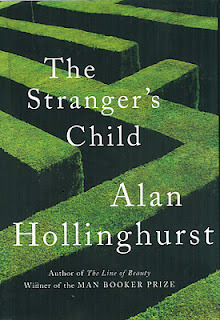 Of course, just as I am sometimes pleasantly surprised by a book, there are times when I’m disappointed, and so it was when I read The Stranger’s Child by Alan Hollinghurst. I’d loved his previous novels, particularly The Line of Beauty, which won the Booker Prize in 2004. And The Stranger’s Child sounded so promising. An aristocratic family with scandalous secrets! A rambling old house in the English countryside! A beautiful young poet, tragically killed in the First World War! The poet’s biographer, who has secrets of his own, struggling to unravel truth from lies! And yet, this novel dragged. There was simultaneously too much detail, and not enough useful information. There were too many unnecessary characters – what, for instance, was the point of introducing the Strange-Paget family, when they added little to the narrative and were never mentioned again after that chapter? And while some of the prose was sharp and amusing, there were too many sentences like this:
Of course, just as I am sometimes pleasantly surprised by a book, there are times when I’m disappointed, and so it was when I read The Stranger’s Child by Alan Hollinghurst. I’d loved his previous novels, particularly The Line of Beauty, which won the Booker Prize in 2004. And The Stranger’s Child sounded so promising. An aristocratic family with scandalous secrets! A rambling old house in the English countryside! A beautiful young poet, tragically killed in the First World War! The poet’s biographer, who has secrets of his own, struggling to unravel truth from lies! And yet, this novel dragged. There was simultaneously too much detail, and not enough useful information. There were too many unnecessary characters – what, for instance, was the point of introducing the Strange-Paget family, when they added little to the narrative and were never mentioned again after that chapter? And while some of the prose was sharp and amusing, there were too many sentences like this:
“Daphne’s second husband’s half-sister married my father’ s eldest brother.”
That was actually a relatively clear explanation of one of the complicated relationships in the novel. Mostly, the reader was left to figure all this out for herself, and I often found myself flipping back to earlier sections, muttering, “Now, what was Revel’s surname? Does that mean Jenny is his daughter? Or no, she’s too young, must be his granddaughter, except wasn’t he gay? Did he end up marrying Daphne, anyway?”
There were parts I found interesting, particularly in the first section, but I had to force myself to finish this book. (Maybe Alan Hollinghurst should have added a cat or two for my benefit.)
To end on a more positive note, I just finished reading the latest novel of one of my favourite authors of all time, and it really did live up to my extremely high expectations. I’m referring to The Beginner’s Goodbye by Anne Tyler, which was absolutely wonderful, and highly recommended if you like her work. I will get around to writing a proper blog post about it soon.
April 30, 2012
Inside a Dog Index
I’ve just finished a month of blog posts at Inside a Dog, the website of the Centre for Youth Literature, so I thought I’d post the links to each post here, for my own reference and for the benefit of anyone else who might be interested.
How To Write a Historical Novel in Seven Easy Steps
1. Think up a good idea for a story
2. Do lots of research
3. Get organised
4. Write lots of words
5. Edit, edit, edit
6. Gaze upon the efforts of the designer and typesetter
7. Admire your finished book
More About Writing a Historical Novel
 Planning vs Not Planning
Planning vs Not Planning
Real People in Historical Fiction
Same Book, But Different (editing for an international readership)
Life in Wartime
Keep Calm and Carry On
Looking Good in Wartime, Part One
Looking Good in Wartime, Part Two
Eating Well in Wartime
Blackout
Animals at War
I promise my next blog post will not mention the FitzOsbornes. Or the Second World War.
April 24, 2012
Vintage Classics Children’s Collection
This week, Random House Australia announced the launch of a new series of classic children’s books, with the first twenty-one books to be published in August. It’s a wonderful list, including some of my favourite children’s books. Alice in Wonderland, Little Women, I Capture the Castle, What Katy Did, Treasure Island, Emil and the Detectives, The Railway Children . . . and guess what? One of the titles is A Brief History of Montmaray! It will have a lovely illustrated cover and will look like this:
Pretty, isn’t it? The other Australian title on the list is Deborah Abela’s The Remarkable Secret of Aurelie Bonhoffen.
In other news, I’m still blogging away at Inside a Dog until the end of the month, so come over and say hello and read about life in wartime England.
April 10, 2012
Miscellaneous Memoranda
- Look what I received yesterday!
It's the North American ARC (Advance Reader's Copy) of The FitzOsbornes at War and it's even bigger than the Australian edition, at a very hefty 554 pages. If you dropped one of these books on your foot, you could do yourself some serious damage. I should point out that the North American edition has more pages because the typeset is bigger, not because it contains more words. Although it does have one extra feature – a FitzOsborne family tree, dated 1955, so you can see the next generation of FitzOsborne cousins. Anyway, now I am busy proofreading all the pages.
- Someone has also created a book trailer for A Brief History of Montmaray. It is excellently done, although the sea monster does look a bit like a whale. (But then, sea monsters are very sneaky and are Masters of Disguise. People sailing through the Bay of Biscay will be innocently strolling about on the deck of their ship and say, 'Oh, look, is that a whaAARRGGHH!' And that's the last you ever see or hear of them.) I was also very impressed that the book trailer's creator carefully cited every image used in the trailer. Well done.
- Congratulations to all the Australian authors whose books were recognised in the Children's Book Council Awards last week. Congratulations also to the New South Wales government, which, after a review, decided to continue the NSW Premier's Literary Awards. The awards will be presented in November this year at the State Library, rather than during the Sydney Writers' Festival in May, as they have been in previous years. No congratulations to the new Queensland government, who decided, without a review, to cancel the Queensland Premier's Literary Awards. It's the National Year of Reading everywhere in Australia except in Queensland, it seems.
- Back in Sydney, the Museum of Sydney is running a Home Front: Wartime Sydney 1939-1945 exhibition from 31st March to 9th September. There will also be various 'Life on the Homefront' events, including 'Dig for Victory' kitchen garden tours, children's activities and a 'Victory in Europe' GI dance on the VE Day anniversary.
- The Sydney Writers' Festival programme is also out, with lots of interest for all readers, including those who like historical and young adult books.
- And I'm still blogging at Inside a Dog and will be giving away a Montmaray book at the end of the month, so come over and say hello.

